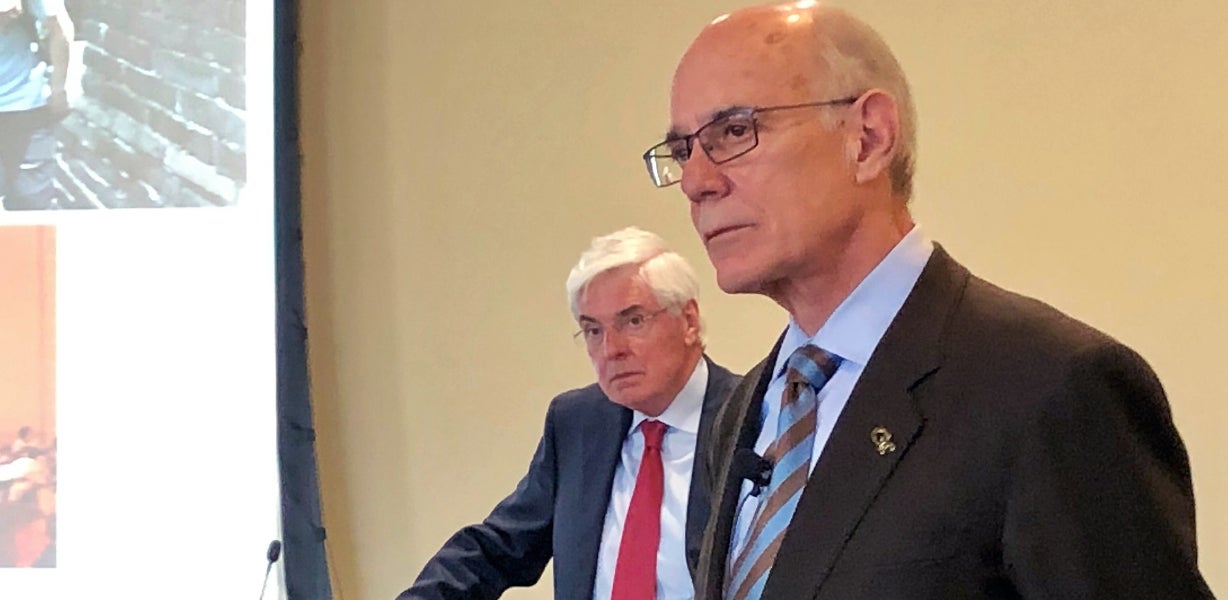Imagining – and beginning to build – the university of tomorrow

Drones delivering library books to doorsteps. Storefronts, rather than campuses, showcasing the university. Computers predicting what individual students need during college – and throughout life.
Those are some of the future visions described by Rafael L. Bras, provost and executive vice president for academic affairs at Georgia Tech.
He recently led a commission that spent two years developing an in-depth report on the coming evolution of higher education, which he discussed during recent appearances at CU Denver, CU Boulder and UCCS. He was invited by Michael Lightner, vice president of academic affairs.
“The churn of knowledge is speeding up,” said Bras, speaking March 20 at CU Denver. “I recall growing up in Puerto Rico, we had milk delivered in a bottle. The bottle came from a cart drawn by a horse. Times change very fast.”
That dizzying pace demands that universities be deliberate about debating higher education’s future in order to develop – and institute – ideas that address challenges, he said.
Among the challenges facing all of higher education is the population’s shrinking percentage of 18-year-olds, Bras said. Those young people who enroll as new freshmen are digital natives who learn by participating.
“They want to be in control of what they’re doing and how they learn,” Bras said.
College students are increasingly diverse; once a graduate enters the job market, they’ll be part of the new gig economy, where they can expect to notch 10 to 15 careers during their professional life.
Those factors and others influenced the report and its five key initiatives, which are already underway or planned for implementation at Georgia Tech:
- Whole-Person Education. “We have transformed our educational system (at Georgia Tech),” Bras said. “Students are afforded the opportunity to, using an old term, get their hands dirty.” He described an engineering lab for students, run by students. “When you empower the students, it works. They police each other.”
- New products and services. The idea of a library as a warehouse for books is no longer relevant, Bras said. Two years ago, virtually all of the books in Georgia Tech’s library were moved into an offsite facility shared with Emory University. The library building gained space for student gathering areas. “If you want a book, it will be delivered to you,” said Bras, adding that he’s at work on a drone delivery system. To address flexibility in degrees and the need for ongoing engagement, stackable microcredentials that are offered online serve graduates throughout their careers.
- Advising for a new era. “We have to think along the lines of a service center,” Bras said. Advising must be personalized and serve a student for their lifetime, given that the traditional path of degree-seeking is disappearing. Pathways that allow for flexible calendars are essential.
- Artificial intelligence and personalization. “We need to understand better what is it that (students) need, and maybe predict ahead of time what (students) need.” To address the high number of student questions in an online Knowledge-Based Artificial Intelligence class, Georgia Tech introduced teaching assistant Jill Watson. Students were unaware that Jill “herself” was artificial intelligence.
- Distributed worldwide presence. Bras said he doesn’t believe in “having campuses all over the place.” Just as the giants of the digital world Apple and Amazon have established select brick-and-mortar locations, his university is planning the Georgia Tech atrium, a scalable storefront to showcase the university’s offerings at locations around the world.
Taking on such initiatives requires a culture that’s “deliberately innovative,” Bras said.
“That’s the hardest part by far,” he said. “If we do not change the mindset of the faculty, staff and students, the rest will never happen.”
The foundation of that culture is a willingness to take risks. Bras told of an online master’s in computer engineering at Georgia Tech delivered by the same faculty and staff who enable traditional degrees.
“We have 8,500 students in that one degree from all over the world, though mostly in the U.S.,” he said. “Practically all of the students are professionals. Employers are happy and we actually make money on it.” Tuition is $7,000.
While MOOCs and MOOC-like courses will be increasingly vital to higher education institutions, Bras said, the traditional college campus experience will continue to be in demand.
“There is a market because there are some things that cannot be substituted – the idea of the residential experience allowing time for growing up,” he said. “We see the value of it.”
He also acknowledged that the creation and operation of online offerings and other innovation requires significant financial investment.
“This is not cheap, it’s really expensive,” he said. “I need a high volume of quality people to make this work. I’m a hydrologist – I would love to pitch a degree online, but there’s no way I can make it work with the 20 people who would show up.”

